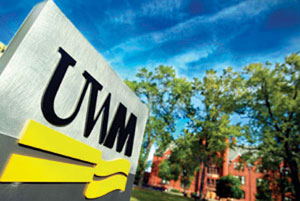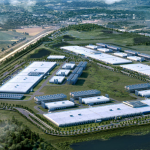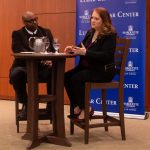Get a daily rundown of the top stories on Urban Milwaukee

UW-Milwaukee
During a recent episode of the Chancellor’s Report UWM Chancellor Carlos Santiago was explaining UWM’s recent growth, and stated that “the city is a big draw.” His efforts to build “Innovation Park” on the Milwaukee County Grounds in Wauwatosa seem to ignore this fact. Of course the city is a big draw, because it offers something that a sprawling office park will never be able to offer students. It offers walkability instead of drivability, McGillicuddy’s instead of Applebee’s, parks instead of parking lots, and diversity instead of iteration. Of course it is a “big draw,” because the city offers an urban experience.
Instead of contributing to the decline of the Milwaukee by drawing investment, students, and potential residents out of the city, UWM could use the city to draw in investment, and talent. If UWM were to work with the Milwaukee, to grow the university within the various neighborhoods, it could in fact become a talent magnet, a draw, for the city. Recently UWM professor Marc Levine wrote in opposition to the UWM’s proposed Wauwatosa expansion in a Journal Sentinel op-ed,
UWM as economic engine? Dream on. Specifically, he argued that, “by investing an estimated $150 million outside Milwaukee, UWM will help spearhead a further outflow of capital and workers from a city that has been buffeted over the past 30 years by growing joblessness, poverty and the suburbanization of industry – hardly a positive contribution to local economic development.” Clearly, if UWM were to invest that $150 million within Milwaukee, it could revitalize neighborhoods, spur development, provide jobs, and help build a stronger Milwaukee, all the while using the city as a “big draw.”
If you’d like UWM, to become a “big draw” for Milwaukee, and for Milwaukee to continue to be the “big draw” for UWM, the UWM Campus Master Plan is still taking input. You can add your comments here.























Dave,
I have come to love your critical analysis on the development of UWM engineering campus in Tosa. Your voice and stance has stirred up a lot of necessary conversations. Being that UWM is likely to build its new graduate engineering campus in Tosa is unfortunate, but I think in the long run UWM’s Tosa campus will find a way to integrate with the Milwaukee Metropolitan Area. I think Tosa’s campus will stimulate further motivation on mass transit in Milwaukee. Simply, only having light rail and other proposed mass transit projects concentrated to downtown and surrounding neighborhoods will ineffectively serve the greater Milwaukee population. Second, the Tosa location offers room for further expansion and growth in the future. While a downtown campus would by no means be a disadvantage, who knows what the state of downtown real estate will be like in the next century in terms of availability. The Tosa location offers better expansion and growth feasibility in terms of long term planning. Third I think it is beneficial to not concentrate all of our region’s universities and colleges in one area. Dispersing our educational centers throughout the Milwaukee region provides greater accessibility and community integration.
I think it is important to look at Milwaukee, not just at the city level, but at the metro level and understand how everything works together. We should be looking at issues like this based on all of our regional needs and resources combined. Why shouldn’t the needs of Waukesha residents be taken into consideration in, for example, mass transit projects for the city of Milwaukee.
I’m not saying I disagree with you by any means. I think your arguments are awesome and stem such great conversations on urban planning. Just thought I would put an optimistic view on the situation.
Unfortunately there is no interest to the West for transit or planning links with Milwaukee.
What there is borders hostility and benigh neglect.
New Berlin did not step forward to help retain the sole transit connection running directly between Milwaukee and the New Berlin Industrial Park, which is the state’s largest.
But which will benefit now from an infusion of Milwaukee water – – and where more than 6,000 jobs and 1,100 homes are projected to be located.
Waukesha County has declined to join a regional transit authority – – and the Waukesha Freeman editorialized that this was the correct stance because the benefits would accrue to Milwaukee.
Data show that 30% of Milwaukee city residents do not own a car or have access to one, so they are basically barred from job opportunities and housing to the West – – while billions of dollars are ibeing poured into widened freeways from Milwaukee in all directions, and through Waukesha County eventually to the Jefferson County line..
You still cannot take a bus from downtown Milwaukee directly to downtown Waukesha.
At a Waukesha Council meeting this week, aldermen wanted reassurances twice that the Great Lakes Compact would not commit Waukesha to partner with Milwauke on issues like transit, housing and development if Waukesha buys Milwaukee water. Indeed, those other matters are not in the Compact’s water sales criteria, but they are in Milwaukee city policy – – so the message coming from Waukesha even before the negotiations have begun: Dont ask us to cooperate regionally and financially on the broad picture.
Waukesha will look to obtain Milwaukee water without broad socio-economic participation, and as New Berlin agreed to pay a one-time fee of $1.5 million – – $75,000 a year for 20 years – – look for Waukesha to offer another relative drop in the bucket to a city that has a billion-dollar annual budget.
That mean Waukesha will continue to expand (it is not land-locked) into areas it will annex to the south and west, for 15-20 square miles, and use Lake Michigan water as a draw, while Milwaukee, (land-locked by special state law), cannot grow its tax base nor obtain obtain a proportionate share of the water-fueled development. where jobs and housing can be absorbed into another water-buying city: Waukesha, following New Berlin..
Dispersing UWM’s infrastructure West of Milwaukee and closer to Waukesha does not bring with it dispesed benefits that accrue evenly or even rationally across the Milwaukee area.
It removes value from Milwaukee, whee economic needs are greatest, and also puts pressures on transit systems, which for the most part regionally are the responsbility of Milwaukee County taxpayers.
If New Berlin, and Brookfield, Waukesha and other communities to the West had already embraced Milwaukee and partnered on services and amenities, we wouldn’t be having this convseration.
But the history, traditions and culture within the region has been to encourage flight from Milwaukee, withdistorted consequences economically, and racially, and I see no signs that things are improving; UWM becomes part of the problem and not the solition if it pushes a campus and business center to the Milwaukee-Waukesha County border,
i like your points, didnt realize any of them. I completely agree. Milwaukee should set up a toll for Waukesha residents coming into Milwaukee, haha.
~thanx James
@James
Wisconsin Coach Lines actually offers routes from numerous points in Milwaukee to Downtown Waukesha for $2.25 each way.
Just throwing these links out there if someone does need transport for more job opportunities and didn’t know about these options.
http://www.milwaukeeworkers.org/trans/trans-work-waukesha.asp
http://www.coachusa.com/wisconsincoach/ss.commuter.asp
Overall I agree with your points. Far more cooperation needs to be initiated to make a more efficient and comprehensive transit network. The health and future of the region depends on it.
@marty There’s nothing critical about Dave’s remarks here at all.
This is the sum of Dave’s response to Levine’s report: “Clearly, if UWM were to invest that $150 million within Milwaukee, it could revitalize neighborhoods, spur development, provide jobs, and help build a stronger Milwaukee, all the while using the city as a ‘big draw.’”
On it’s face, this is really nothing more than nothing. All statements in this form are true. “Clearly, if [TAX-FUNDED ORGAN] drops [$N MILLION] it could [HAVE ANCILLARY BENEFITS X, Y, AND Z]”
It is also true that people in hell want ice water, and they desperately hope it is coming.
@Dave – Nate sent me a lengthy summary of his notes on the report and may be doing something more with it.
@Dan Yes I didn’t really go into the report in depth. Mainly I believe Prof Levine argues the value is in retaining talent and growing talent, and that the actually $150 million of economic development would be of value to the city. That said at the same time he doesn’t put much stock in the research itself as far as spin off value, as his research indicates this is more rare than common.
Well, UWM research has given at least one person a job, Marc Levine.
@James
So true. The separation-based attitude of Waukesha and even the surrounding Milwaukee suburbs (having grown up in Wauwatosa, I know this mindset exists there) is staunch and UWM is not helping by even considering moving 150 million dollars outside of the city. It’s not UW-Wauwatosa, UW-New Berlin or UW-Waukesha (already one of those). It’s UW-MILWAUKEE. UWM should invest that into the city that they are deeply entrenched in and perhaps they will reap future benefits instead of throwing money at communities that will NOT return much of the favor.